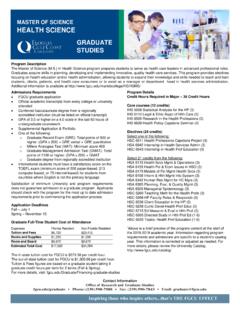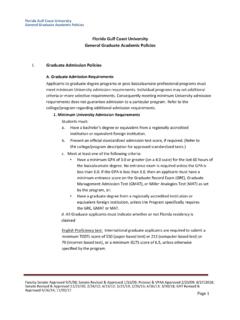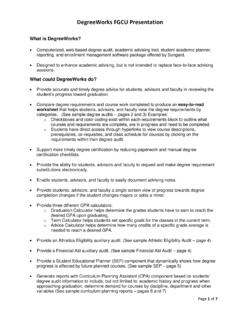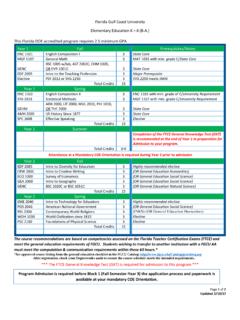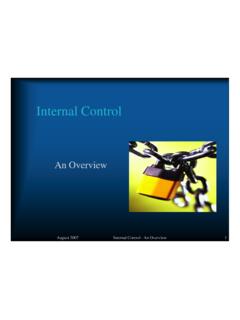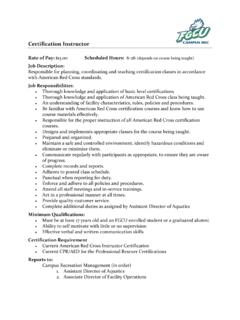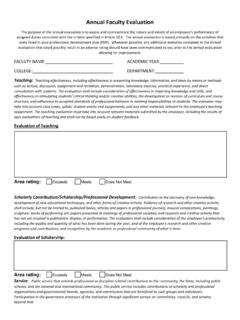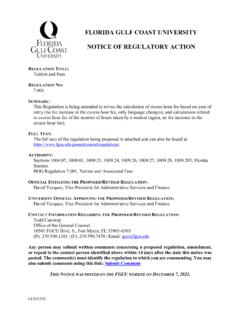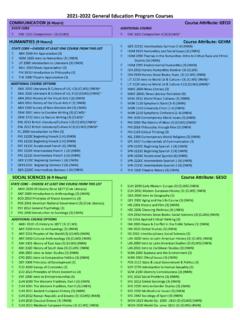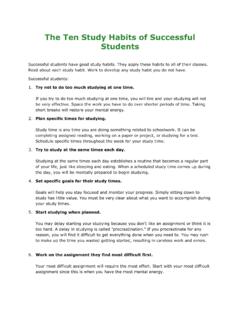Transcription of The influence of eating habits on the academic performance ...
1 Full Terms & Conditions of access and use can be found of American College HealthISSN: 0744-8481 (Print) 1940-3208 (Online) Journal homepage: influence of eating habits on the academicperformance of university studentsPeter R. Reuter, Bridget L. Forster & Sierra R. BristerTo cite this article: Peter R. Reuter, Bridget L. Forster & Sierra R. Brister (2020): The influenceof eating habits on the academic performance of university students, Journal of American CollegeHealthTo link to this article: supplementary material Published online: 06 Feb your article to this journal View related articles View Crossmark dataMAJOR ARTICLEThe influence of eating habits on the academic performanceof university studentsPeter R. Reuter, MD, PhD, Bridget L. Forster, BS (student), and Sierra R. Brister, BS (student)Department of Rehabilitation Sciences, Marieb College of Health & Human Services, Florida Gulf Coast University, Fort Myers, Florida, USAABSTRACTO bjective:To explore the correlation between eating habits of university students and :577 undergraduate students at a university in the United :Students were invited to participate in an anonymous online survey that asked ques-tions concerning health-related behaviors; participants were asked to report their current gradepoint average (GPA).
2 Statistical analyses were performed using the JMP software program; a stand-ard least squares regression was used to test whether self-reported current GPA was related to dif-ferent types and rates of weekly food and drink :Self-reported GPA did not change along with weekly rates of milk, vegetables, greensalad, fruit juice, or fresh fruit consumption. Breakfast consumption had a positive effect on self-reported GPA, while fast food consumption had a negative :Healthy eating habits have a positive effect on students academic , other factors, such as sleep habits , may be more HISTORYR eceived 28 August 2019 Revised 25 November 2019 Accepted 30 December 2019 KEYWORDSA cademic achievement;breakfast; college students;fast food consumption;grade point average;healthy eatingIntroductionWith more focus being placed on grade point average(GPA) and overall academic performance in college, it isimportant to explore how life style factors, particularly eat-ing behavior, can influence students academic success.
3 Ashigh schoolers transition to college, oftentimes their health-related habits will change as they adjust to new resources,lack of parental guidance, and a different been widely acknowledged that university studentsare far from reaching the public, national, and global healthrecommendations when it comes to dietary ,3 Whereas a student s university career requires clear nutritionpriorities and dietary habits , their eating behaviors can nega-tively impact cognitive function, and, consequently, fail toproperly support scholastic ,5To make matterseven worse, these negative behaviors tend to worsen furtheras students progress through number of published studies have explored the correl-ation of eating habits and associated GPA/grades; however,most of this research focused on students in Pre-Kthrough high ,7On the other hand, there are only alimited number of studies concerning college ,9 Nonetheless, these studies are consistent with providing evi-dence that poor eating habits adversely impact academicperformance, while healthy dietary behaviors are favorablepredictors of academic some studies reported higher academic achieve-ment for college students who consumed a greater volumeof fruits and vegetables, it has also been reported that a vastmajority of undergraduates do not meet the recommendeddaily serving of fruits and ,9 11 When college stu-dents did consume a larger amount of produce, their GPAwas enhanced by as much as systematicreview on the relationship between eating habits and aca-demic success for university students looked at seven differ-ent studies and found that five of those reported higheracademic achievement with increased fruit.
4 Students who had an increased intake of fastfood experienced a decrease in GPA in another consumption has also been proven to strengthenscholastic achievement as well as being essential in developinga wholesome positive lifestyle. Breakfast increases glucose lev-els which in return can lead to improved memory, immediaterecall, attention span, and, subsequently, to improved 8,13,14 Phillips sstudy8found that students who atesome type of breakfast before exams had a higher passingrate than students who did not. Benton and Parker13showedthat fasting in the morning negatively affects the ability toremember word lists, and lectures, as well as the recall ofitems while counting topic of food insecurity should also be consideredwhen observing how nutrition affects students classroomCONTACTP eter of Rehabilitation Sciences, Marieb College of Health & Human Services, Florida Gulf CoastUniversity, 10501 FGCU Boulevard South, Marieb Hall 419, Fort Myers, Florida 33912, data for this article can be accessed online versions of one or more of the figures in the article can be found online 2020 Taylor & Francis Group.
5 LLCJOURNAL OF AMERICAN COLLEGE Students are particularly susceptible to foodinsecurity because of the rising costs of attending inaccessibility of balanced food sources tends toguide individuals to undernourishment or negative foodbehaviors such as an elevated consumption of fast food andsoft patterns undesirably impact intellectualdevelopment, capability to work productively, and compro-mises students complete majority of studentsfacing food insecurities also reported adverse effects on theiracademic performances as well as an inability to concentrate,which led to failed exams or withdrawing from of the studies involving college students havelooked at risky health behaviors such as drug and alcoholuse rather than routines that are encouraging ,9 Thereview by Burrows et that college studentsare an understudied population in regard to eating habitsthat foster academic success. Burkhalter and Hillman5statedthat the study of college students health behaviors and theirrelationship to academic achievement is in its infancy.
6 Thepurpose of this study was to further explore the influenceeating habits of university students have on their overall aca-demic performance by using GPA as an outcome was hypothesized that academic performance of collegestudents would be better when healthy eating behaviorswere practiced more research statementThe research protocol and its amendment were approved byan ethical review board (Institutional Review Board (IRB))at Florida Gulf Coast University (FGCU) prior to data col-lection (FGCU IRB 2018-17, March 30, 2018). All research-ers involved in the study were trained in ethical datacollection through the Collaborative Institutional TrainingInitiative (CITI). Data collection followed all laws relevantto the survey of university student collectionData were collected over three semesters (Spring 2018, Fall2018, and Spring 2019) between April 1, 2018 and January31, 2019 using an anonymous online survey (Appendix 1).In order to reach as many students from different majors aspossible, instructors from all colleges at FGCU were askedfor permission to invite students in their classes to take thesurvey titled Student Health Behavior and AcademicSuccess.
7 Students enrolled in those classes as well as theclasses of the study PI were invited to participate in theonline first page of the survey consisted of an IRB (IRB)approved online survey consent form; in other words, con-sent was obtained. Participation in the study was completelyvoluntary and students were free to change their mind andstop participation at any time, for any reason, without pen-alty or loss of any future services they may be eligible toreceive from the survey consisted of five groups of questions aroundhealth and wellness, requesting information among othertopics regarding demographic information, such as gender,age, ethnicity/race, year at school, and current overall gradepoint average (GPA), and about eating habits and fluidintake. Most of the questions were modeled after questionsused in the 2017 Standard High School Youth Risk BehaviorSurvey (YRBS).17 Participants were asked to provide their current overallGPA as well as the overall GPA at the end of their freshmanyear if they were sophomore, junior or senior students, theiroverall GPA at the end of their sophomore year if they werejunior or senior students, and their overall GPA at the endof their junior year if they were senior students (seeAppendix 1).
8 However, for the purpose of this article onlythe self-reported current GPA was healthy eating habits , participants were askedhow many times during the past seven days they had eatenvegetables, fruit, or green salad, or had consumed 100% fruitjuice or a glass of milk. The answer options were 0 times(not at all), 1 to 3 times, 4 to 6 times, 7 to 10 times, and 11times or more for eating vegetables, fruit or green salad aswell as for drinking fruit juice. For drinking milk, the answeroptions were 0 glasses (not at all), 1 to 3 glasses, 4 to 6glasses, 7 to 10 glasses, and 11 glasses or more (seeAppendix1). Participants were also asked how often during the pastseven days they had consumed a can, glass or bottle of soda,diet soda, energy drink, or sports drink. The answer choiceswere 0 times (not at all), 1 to 3 times, 4 to 6 times, 7 to 10times, and 11 times or more (seeAppendix 1). Finally, partic-ipants were asked to provide information on the number oftimes they ate breakfast on a weekly basis (scale: 0 days perweek to 7 days per week) as well as the number of times perweek they consumed fast food (Appendix 1).
9 Data analysesFor questions with categorical answers, data are presented aspercentage of the total participant pool, or a portion of thispool. For questions with quantitative answers, data are pre-sented as means with standard deviations. Sample sizes varyfor different analyses due to the voluntary nature of the sur-vey, but are indicated. All statistical analyses were performedusing the JMP software program (JMPVR, Version 14; SASI nstitute Inc., Cary, NC, USA). A standard least squaresregression was used to test whether self-reported currentGPA (scale: to ) was related to different types andrates of weekly food and drink populationThe online survey was completed by 653 students. However,76 responses were excluded from data analysis because theyindicated an age younger than 18 years of age or did notprovide a current GPA. Of the 577 study responses ana-lyzed, were from female students (n 460) and R. REUTER ET male students (n 117). Students from the freshmanclass made up (n 181) of participants; sophomoresmade up (n 173), juniors (n 147), andseniors (n 67).
10 Second degree-seeking students andgraduate students made up less than 1% of the totalresponses each ( and respectively). Four partici-pants ( ) did not provide information. Almost all studyparticipants were full-time students ( ;n 554); only15 students ( ) were part-time students. Eight partici-pants ( ) did not provide mean age of respondents was years(mean standard deviation; range: 18 25 years; median age 19 years). The majority of respondents identified asCaucasian/White (n 337, ), Hispanic (n 94, ),or African-American/Black (n 34, ). Respondentsidentifying as East Asian or Non-Hispanic made up ofthe respondents each (n 7). All other respondents identi-fied as more than one ethnicity/race or as an ethnicity/raceother than the ones listed above (n 96, ). Tworespondents did not provide more than 40% of respondents ( ;n 247)were students in the College of Arts & Sciences, (n 200) were students in the Marieb College of Health &Human Services, (n 54) were from the LutgertCollege of Business, (n 39) from the WhitakerCollege of Engineering, and (n 25) from the Collegeof Education.
